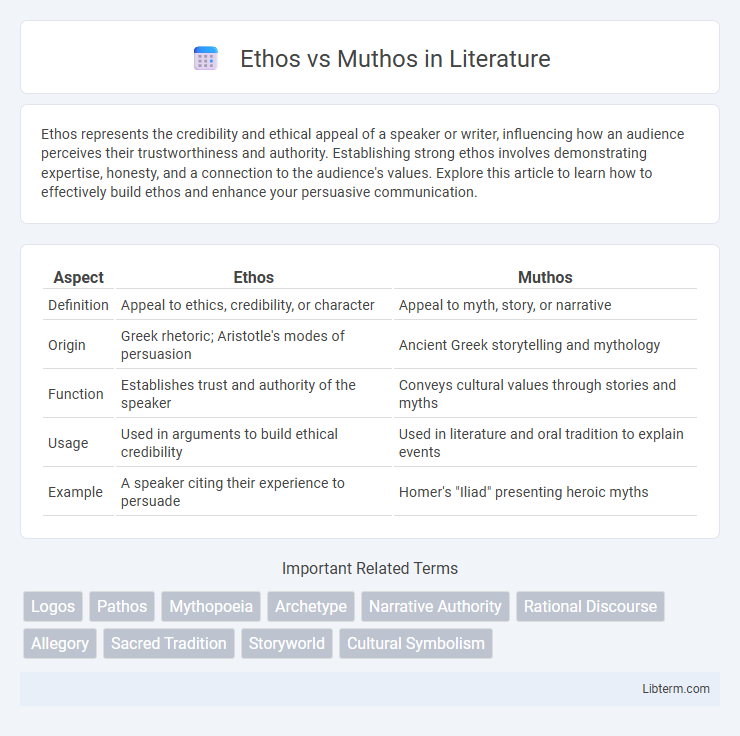Ethos represents the credibility and ethical appeal of a speaker or writer, influencing how an audience perceives their trustworthiness and authority. Establishing strong ethos involves demonstrating expertise, honesty, and a connection to the audience's values. Explore this article to learn how to effectively build ethos and enhance your persuasive communication.
Table of Comparison
| Aspect | Ethos | Muthos |
|---|---|---|
| Definition | Appeal to ethics, credibility, or character | Appeal to myth, story, or narrative |
| Origin | Greek rhetoric; Aristotle's modes of persuasion | Ancient Greek storytelling and mythology |
| Function | Establishes trust and authority of the speaker | Conveys cultural values through stories and myths |
| Usage | Used in arguments to build ethical credibility | Used in literature and oral tradition to explain events |
| Example | A speaker citing their experience to persuade | Homer's "Iliad" presenting heroic myths |
Introduction to Ethos and Muthos
Ethos represents the ethical character and credibility of a speaker or writer, essential in persuasive communication to establish trust and authority. Muthos refers to the structured narrative or mythological story that conveys cultural values and collective beliefs within a society. Understanding the distinction between Ethos and Muthos illuminates how persuasion and storytelling operate in rhetoric and literature.
Defining Ethos: Meaning and Origins
Ethos, originating from ancient Greek philosophy, refers to the character, credibility, and ethical appeal that a speaker or writer establishes to persuade an audience. Rooted in Aristotle's rhetorical framework, ethos emphasizes the importance of trustworthiness and moral authority in effective communication. Unlike muthos, which relates to myth or narrative storytelling, ethos centers on the speaker's integrity and ability to inspire confidence.
Exploring Muthos: From Myth to Narrative
Muthos, rooted in ancient mythological traditions, functions as a powerful narrative framework that conveys cultural values, collective memory, and existential meaning through stories transcending mere facts. Unlike Ethos, which centers on ethical character and credibility, Muthos emphasizes symbolic storytelling that shapes identity and worldview across generations. Exploring Muthos reveals how myth evolves into narrative, embedding archetypal themes that influence literature, religion, and cultural psychology.
Ethos in Classical Rhetoric and Philosophy
Ethos in Classical Rhetoric refers to the speaker's credibility and moral character, essential for persuading an audience effectively. Rooted in Aristotelian philosophy, Ethos establishes trust by demonstrating expertise, integrity, and goodwill toward the audience. This rhetorical element contrasts with Muthos, which appeals to emotion through storytelling rather than ethical appeal.
The Role of Muthos in Ancient Storytelling
Muthos in ancient storytelling functioned as a foundational narrative framework that conveyed cultural values, religious beliefs, and collective memory through mythic tales and oral traditions. Unlike Ethos, which centers on character and ethical appeal, Muthos shaped communal identity by embedding symbolic meanings and cosmic order within stories passed down generations. The power of Muthos lay in its ability to connect audiences to universal truths and shared human experiences via allegorical and mythological content.
Key Differences Between Ethos and Muthos
Ethos centers on character and ethical appeal, emphasizing credibility, trustworthiness, and moral values to persuade an audience. Muthos, rooted in narrative and mythological storytelling, relies on traditional tales and cultural symbols to convey meaning and evoke emotional resonance. The key difference lies in Ethos appealing to ethical integrity and rational judgment, while Muthos appeals to mythic structure and collective cultural identity.
Ethos and Muthos in Modern Discourse
Ethos and Muthos serve distinct roles in modern discourse, with Ethos emphasizing credibility, character, and authority to persuade audiences through trustworthiness and ethical appeal. Muthos, rooted in narrative and myth, shapes cultural identity and collective understanding by invoking symbolic stories and shared values that resonate emotionally. Contemporary communication often blends Ethos and Muthos to build persuasive arguments that appeal to both reason and cultural imagination.
Examples of Ethos vs Muthos in Literature
Ethos in literature represents the ethical appeal or character of a speaker or writer, demonstrated by examples like Atticus Finch in Harper Lee's *To Kill a Mockingbird*, who embodies integrity and moral courage. Muthos, on the other hand, refers to the narrative or plot-driven aspect rooted in myth and tradition, as seen in Homer's *The Odyssey*, where heroic quests and divine interventions shape the story. The contrast between Ethos and Muthos highlights the tension between character-driven persuasion and story-driven meaning within literary works.
The Impact of Ethos and Muthos on Culture
Ethos shapes culture by embodying the collective values, ethics, and character that guide societal behavior and norms. Muthos influences culture through shared myths, stories, and traditions that preserve historical identity and convey moral lessons. Together, Ethos and Muthos create a dynamic framework that sustains cultural continuity and fosters communal cohesion.
Conclusion: Integrating Ethos and Muthos
Integrating Ethos and Muthos enhances communication by combining credibility with cultural narrative, fostering deeper audience engagement. Ethos establishes trust through ethical appeal and authority, while Muthos evokes emotional resonance via myth and storytelling. Together, they create a powerful synthesis that enriches persuasion and meaning in rhetoric and discourse.
Ethos Infographic

 libterm.com
libterm.com